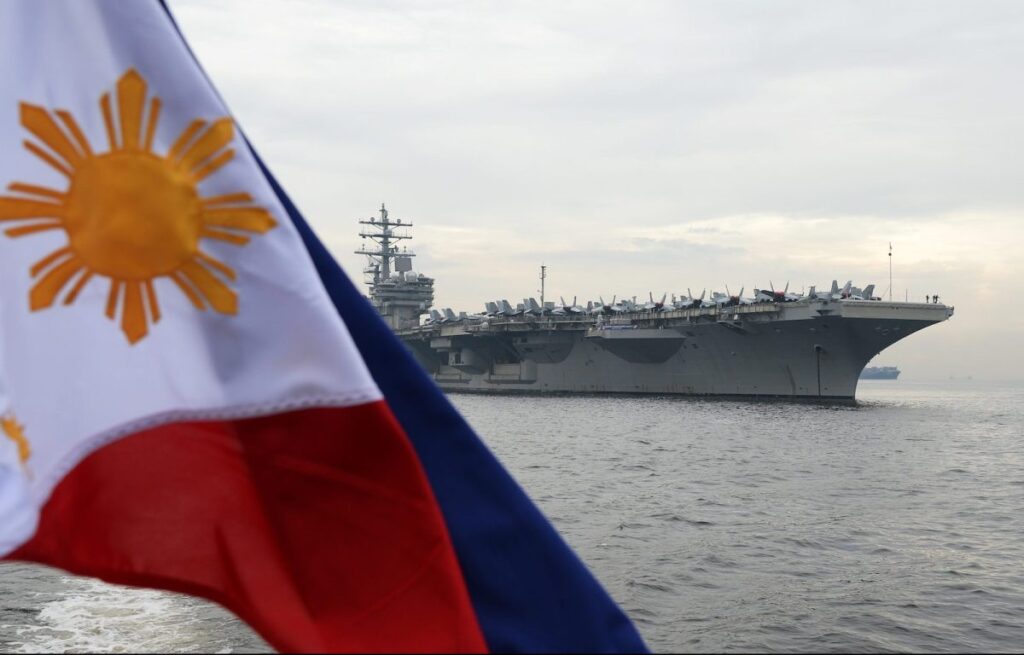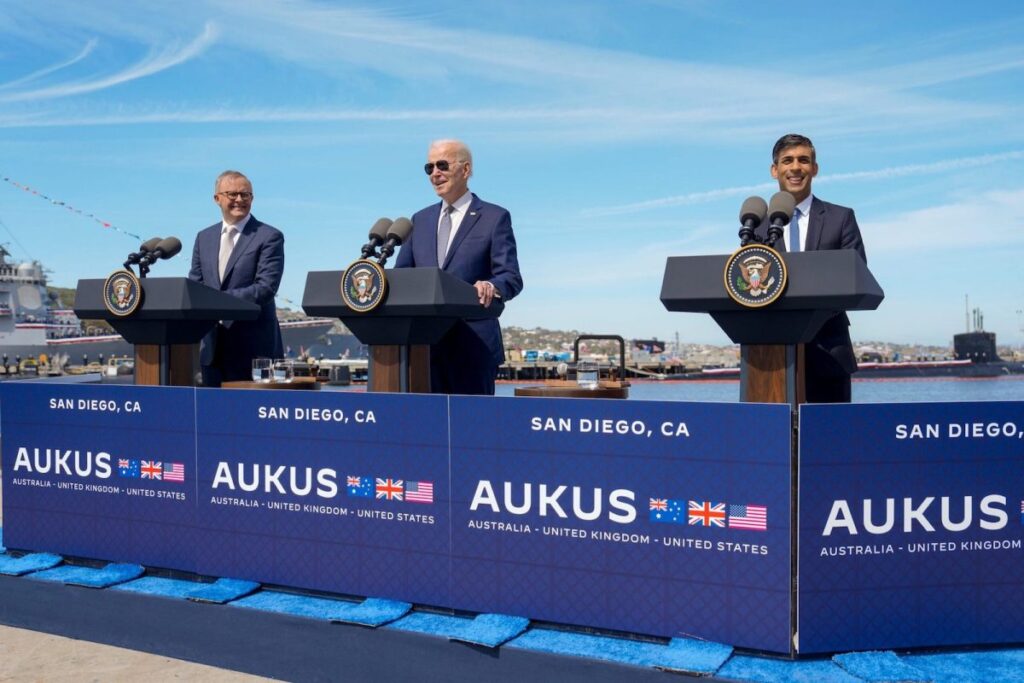Nuke submarine deal seen by some as threat to ZOPFAN and TAC treaties that seek to keep peace and great power rivalry at bay
“I would say, ‘Do you need to be contained? Are you expanding? Are you an expansionist power?’ To a very great extent, the United States was the champion for China’s rise. And in no way are we seeking to contain China. But we are seeking for them to play by the rules,” said Admiral Samuel Paparo, commander of the US Indo-Pacific Fleet, in a recent interview.
Many regional states have been forced “to forge closer military ties to the US” in response to “China’s increasingly aggressive moves in the Western Pacific – encroaching on territory, illegal fishing and building bases in the middle of the South China Sea,” the four-star admiral said.
Paparo’s statement was strategically delivered to coincide with the recently-announced US$368 billion Australia-UK-US (AUKUS) submarine deal, which aims to enhance the anglophone allies’ ability to project power across the Indo-Pacific well into the 21st century. But many neighboring states, including those in the Association of Southeast Asian Nations (ASEAN), are skeptical of the deal and its implications for regional security.
For them, AUKUS is a clear reflection of an emerging US-led “containment strategy” against China, especially amid rising tensions over Taiwan and across the South and East China Seas in recent years.
Chinese Foreign Ministry spokesman Wang Wenbin predictably warned the AUKUS deal would “exacerbate” regional tensions and “totally disregarded the concerns of the international community and gone further down the wrong and dangerous path.”
But some Southeast Asian states, most notably Indonesia and Malaysia, also worry that the AUKUS deal will intensify a building regional “arms race” and, along the way, further undermine ASEAN’s centrality.
Meanwhile, the AUKUS deal has also put Australia’s Anthony Albanese administration in a political bind with stinging opposition aired by fellow Labour Party stalwarts, including not least former prime minister Paul Keating.
“Naturally, I should prefer to be singing the praises of the government in all matters, but these issues carry deadly consequences for Australia and I believe it is incumbent on any former prime minister, particularly now, a Labour one, to alert the country to the dangerous and unnecessary journey on which the government is now embarking,” he wrote in a strongly-worded public statement.
“Falling into a major mistake, Anthony Albanese…emerges as prime minister with an American sword to rattle at the neighborhood to impress upon it the United States’ esteemed view of its untrammeled destiny,” the former Australian prime minister added.

Paul Keating is an AUKUS critic. Image: Facebook
It could also complicate Australia’s strategic reboot with ASEAN following years of relatively tense relations under the former Scott Morrison administration.
Since coming to power last year, the Albanese administration has placed ASEAN at the center of its regional diplomacy. In fact, Albanese and his Foreign Minister Penny Wong visited key Southeast Asian capitals shortly after winning election.
During his maiden visit to the region last year, Australian Defense Minister Richard Marles made it clear that “ASEAN is completely central to Australia’s security interests and our economic interests, and you’ll see a focus on this region.
”From its very inception, the nuclear-powered submarine deal has been deeply controversial. Both US allies in Europe, most especially France, as well as key partners in the Indo-Pacific from Indonesia to New Zealand, expressed deep concerns when the trilateral grouping first announced its nuclear-powered submarine deal back in 2021.
Although the AUKUS deal involves nuclear-powered yet conventionally-armed submarines, rather than nuclear-weapons carrying platforms, regional states have nerveless expressed worries over threats to key ASEAN initiatives, namely the 1971 Zone of Peace, Freedom and Neutrality in Southeast Asia (ZOPFAN) as well as the 1976 Treaty of Amity and Cooperation (TAC), which broadly seek to maintain regional peace and renounce the threat or use of force.
As ASEAN’s current rotational chairman, Indonesia was among first regional states to respond to the AUKUS submarine deal last week.
“Indonesia has been closely following the security partnership of AUKUS, particularly the announcement on the pathway to achieve AUKUS critical capability,” Indonesia’s Ministry of Foreign Affairs said in a statement. “Maintaining peace and stability in the region is the responsibility of all countries. It is critical for all countries to be a part of this effort,” it added.
With ZOPFAN and Australia’s accession to the TAC in mind, Indonesia reminded its southern neighbor how it “expects Australia to remain consistent in fulfilling its obligations under the NPT [Non-Proliferation. Treaty] and IAEA [International Atomic Energy Agency] Safeguards, as well as to develop with the IAEA a verification mechanism that is effective, transparent and non–discriminatory.

”Australian Prime Minister Anthony Albanese and Indonesian President Joko Widodo walk their bicycles during a ride around the grounds of Bogor Palace. Indonesia. Photo: Pool
Malaysia, which has been ASEAN’s fiercest AUKUS critic, reiterated its lingering concerns, though it didn’t say it would pursue direct “consultations” with China on the matter, as it did in late-2021. In a public statement, the Malaysian foreign minister called on “all parties to fully respect and comply with its existing national regime in relation to the operation of nuclear-powered submarines in its waters.”
A linchpin of ASEAN, Malaysia warned AUKUS members against “any provocation that could potentially trigger an arms race or affect peace and security in the region.”
Leading ASEAN experts are also ringing certain alarms. Prominent Thai academic Thitinan Pongsudhirak, a professor at Thailand’s Chulalongkorn University, has questioned the necessity for the new submarine deal since “there are enough measures out there” to constrain China.
He underscored how ASEAN is “increasingly divided” amid US-China competition since “all member states need economic ties with China but rely on the US for stability and security.”
In a November 27, 2022 paper for the China International Security Review journal, published by Peking University, Mingjing Li writes, “Despite the divergence in regional states’ views, we can perhaps draw this conclusion: one year after the pronouncement of AUKUS, ASEAN as a collective entity has already cautiously accepted AUKUS as a new reality.”
Li added: “Facing ASEAN now are two highly challenging tasks: first, how to carefully address the intensifying US-China rivalry; second, how to deal with the threats to its unity and centrality posed by this new tripartite security arrangement. Also, it is quite clear from ASEAN’s grudging embrace of AUKUS that this minilateral security pact will instigate many new dynamics in Indo-Pacific regional security.”
In a diplomatic bid to win over critics, Australian Foreign Minister Wong and US Assistant Secretary of State for East Asian and Pacific Affairs Daniel J Kritenbrink reached out to ASEAN to explain “what AUKUS is and what AUKUS is not.”
“AUKUS is about promoting peace, stability, security and prosperity across the Indo-Pacific region, it’s a modernization of our existing alliances and partnerships,” the US official said during recent visits to Kuala Lumpur and Jakarta. “This is a responsible and transparent agreement that is carried out in the name of the highest standards of non-proliferation,” he added.
For her part, Wong told Singapore’s Channel News Asia that Canberra planned to “talk with the region and listen to the region about any concerns they may have.” She also reiterated that her country “will never seek to acquire nuclear weapons.”
To be sure, not all regional states are opposed to AUKUS. Although largely refraining from making any categorical statement, key ASEAN members such as Vietnam and Singapore have been broadly sympathetic to AUKUS, recognizing the need to counterbalance China’s expanding military footprint in the region.

The Philippines, which has doubled down on defense cooperation with the US, Australia and Japan under President Ferdinand Marcos Jr, has publicly backed the AUKUS deal.
“For the Philippines, it is important that partnerships or arrangements in the Indo-Pacific region, such as AUKUS, support our pursuit of deeper regional cooperation and sustained economic vitality and resilience, which are essential to our national development and to the security of the region,” the Philippine Department of Foreign Affairs said in a statement.
“We consider it important for these arrangements to uphold ASEAN’s central role in the regional security architecture, and reinforce an international rules-based order that underpins regional security and development,” the statement said.
Source: Asia Times


